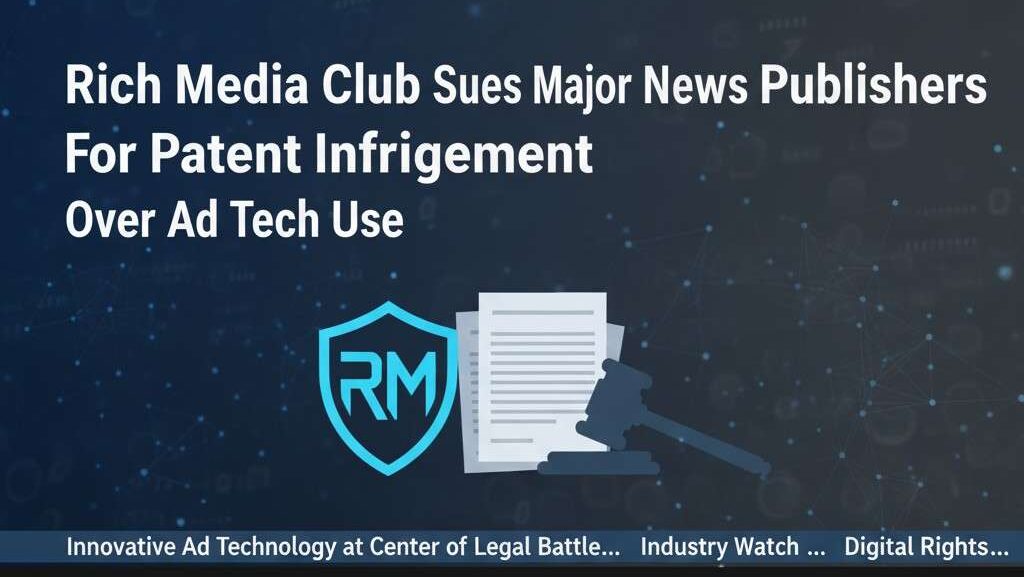Rich Media Club has filed a major patent infringement lawsuit against top news publishers, including Gannett, The Guardian, and News Corp, alleging unauthorized use of its ad technology. Learn all details, legal context, and potential impact on the media industry.
Rich Media Club Sues Gannett, The Guardian, and News Corp for Patent Infringement
A major legal battle has begun in the digital advertising world. Rich Media Club, a technology company specializing in advertising software, has filed patent infringement lawsuits against several well-known news publishers — including Gannett, The Guardian, and News Corp.
The company claims that these media giants used its patented advertising technology (ad tech) without proper licensing or authorization.
What Is the Case About?
According to legal filings, Rich Media Club alleges that the publishers have been using its patented ad display and tracking systems to manage and deliver online advertisements.
These technologies are designed to help websites show, measure, and optimize ads more efficiently — an essential part of online revenue generation.
The Rich Media Club argues that its proprietary code and technology have been directly incorporated into publishers’ advertising platforms without permission, thereby violating intellectual property laws.
What Does “Patent Infringement” Mean?
Patent infringement occurs when a company or individual uses another party’s patented invention or technology without legal consent or a licensing agreement.
In this case, Rich Media Club holds patents related to digital ad serving and performance analytics, which they claim were used by the publishers without payment or acknowledgment.
Why This Case Matters
This lawsuit highlights the growing tension between technology providers and digital media companies that rely heavily on advertising revenue.
As online advertising becomes increasingly complex, publishers are increasingly dependent on third-party tools — often unaware that these systems are protected by patents.
If the court rules in favor of Rich Media Club, the decision could:
- Force media companies to pay heavy damages or royalties
- Change how online ads are served and tracked
- Encourage more patent enforcement cases in the digital media sector
Possible Legal Outcomes
Legal experts suggest three likely outcomes:
- Settlement: The publishers could choose to settle and pay licensing fees.
- Court Ruling: If the court finds infringement, fines and injunctions could follow.
- Dismissal: If publishers prove independent development or invalid patents, the case might be dismissed.
Regardless, the case will set an important precedent for intellectual property rights in digital advertising.
Conclusion:
The Rich Media Club vs. Gannett, The Guardian, and News Corp lawsuit marks a significant turning point in the relationship between ad tech creators and media platforms.
As the digital ecosystem becomes more tech-driven, respecting patent rights and ensuring proper licensing will be crucial for all players in the online advertising industry.
FAQ: Rich Media Club vs Major News Publishers Patent Infringement Case
What is the Rich Media Club lawsuit about?
The lawsuit claims that major news publishers — including Gannett, The Guardian, and News Corp — used Rich Media Club’s patented advertising technology (ad tech) without authorization or a valid license. The company alleges this constitutes patent infringement under intellectual property law.
What is ad tech, and why is it important?
Ad tech refers to digital tools and software used to manage, display, and analyze online advertisements. It helps websites target the right audiences, measure ad performance, and maximize revenue. The lawsuit centers around specific ad tech systems that Rich Media Club says it invented and patented.
What does patent infringement mean?
Patent infringement occurs when someone uses, sells, or distributes a patented invention without the patent owner’s permission. In this case, Rich Media Club accuses the publishers of using its protected advertising system without obtaining a proper license agreement.
Which companies are involved in this case?
Gannett Co. Inc. (publisher of USA Today)
The Guardian Media Group
News Corp, the parent company of The Wall Street Journal and The Times

























